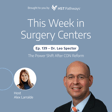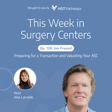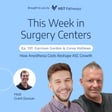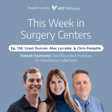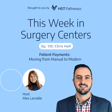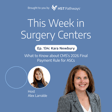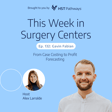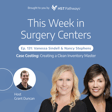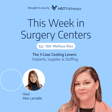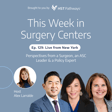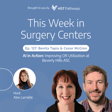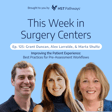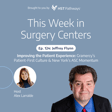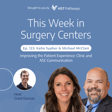Introduction to 'This Week in Surgery Centers'
00:00:01
Speaker
Welcome to This Week in Surgery Centers. If you're in the ASC industry, then you're in the right place. Every week, we'll start the episode off by sharing an interesting conversation we had with our featured guests, and then we'll close the episode by recapping the latest news impacting surgery centers. We're excited to share with you what we have, so let's get started and see what the industry's been up to.
Opening New Surgery Centers: Experience and Feasibility
00:00:28
Speaker
Here's what you can expect on today's episode. Will Schlaf is no stranger to the process of opening up a new surgery center. As an ASC Development and Operations Specialist, he has worked on many new builds from their infancy stage all the way through to the first patient walking in the door.
00:00:47
Speaker
Today, he joins us to talk about the importance and logistics of conducting a comprehensive feasibility assessment before you start working on a new surgery center. So, from determining market demand to physician recruitment to securing financing, Will and our host, Nick, cover as much as they can on this critical piece of the puzzle.
Upcoming News: Staffing Solutions and Gene Therapy
00:01:08
Speaker
In our news recap, we'll cover how one community in Michigan is fixing their sterile processing technician shortage, some advice from an admin in Idaho on how to get creative to solve your staffing and supply chain issues, various ways to celebrate National ASC Month, and of course, end the news segment with a positive story about an experimental gene therapy gel that has helped one teen gain his sight back.
00:01:35
Speaker
Hope everyone enjoys the episode and here's what's going on this week in Surgery Centers.
The De Novo Process and Feasibility Assessments
00:01:51
Speaker
for the conversation. So wanted to talk a little bit about the de novo process today and specifically feasibility assessments on the upfront side of planning a de novo. There's lots of buzz in the market today as it relates to de novos and new facility development from an outpatient perspective. In your experience, what are the most common reasons that folks think about starting de novo ASEs?
00:02:18
Speaker
I mean, I guess there's two perspectives. There's going to be the physician's perspective and the hospital's perspective. From a physician perspective, you're looking at a new source of income and building a valuable asset. Almost more importantly though, there's the convenience factor and the efficiency factor. You know, docs spend a lot of time in the OR, in the hospitals waiting for ORs to open up, sitting around and having an ASC.
00:02:48
Speaker
It's going to improve their quality of life. They might actually have a chance to spend more time with their family, enjoy some hobbies, get out and play nine holes in the afternoon. And they also have control over their environment, over their staff, and which, and it's also patient advocacy. You're offering a lower cost, higher quality of care, which is going to increase patient satisfaction and eventually, hopefully lower the cost of healthcare overall.
00:03:15
Speaker
You know, from a hospital's perspective, and now it's interesting even more than it was, is the trends of price transparency and quality transparency. The hospitals
Certificate of Need: Trends and Impact
00:03:30
Speaker
You know, previously they were resisting the ANPs as competitors. They're jumping on the bandwagon. And they look at it as a physician retention and recruitment tool. And they also use it as a, they can migrate less profitable cases out of the hospital setting and opening up a large time for more profitable cases on their campuses.
00:03:53
Speaker
Sure. Okay. That's helpful. So Will, different kind of perspectives and value props. You mentioned the physician value prop, the hospital value prop for considering a de novo ASC facility. As folks
Business Planning for ASCs: Regulatory and Financial Considerations
00:04:06
Speaker
are thinking about this from a business planning perspective, what are some of the initial things they need to do or be thinking about from an upfront evaluation perspective?
00:04:18
Speaker
Well, first thing you need to think about is the regulatory environment, state and federal. And then you need to make sure that you are looking at the financial feasibility of
00:04:34
Speaker
any de novo project, absolutely. Got it. And the feasibility assessment is something I wanted to unpack with you because I understand it's a key kind of part of the evaluation process. So as we're thinking about that feasibility assessment stage, the business planning stage, what are some of the key components that go into that? Maybe if you can kind of help me brainstorm on the different pieces, you know, we'll start to deep dive a little bit into each of those.
00:05:01
Speaker
Yeah, well, you want to start regulatory, right? Because that's going to be the first hurdle that you're going to have to overcome. And a lot of that starts at the state level.
00:05:13
Speaker
Right. So in healthcare, there's things called certificate of need. And we can dive into certificate of need program. This is not all state. So first thing, look up and see if your state has a CON requirement that affects developments of surgery centers. Okay. Off the top of my head, I believe that there's 35 states that require CONs for all types of healthcare facilities. Okay. I believe.
00:05:40
Speaker
Now 27 of them require CON requirements for the development of a surgery center. Those requirements change from state to state. So if you are in a CON state, make sure that you do your due diligence and you know what you're getting into. A lot of times CONs to obtain them can be very expensive and also impossible. There may be some states even have a moratorium on them.
00:06:05
Speaker
So that would be the first step. So it sounds like roughly half and half on certificate of needs states in terms of if they have that requirement or they don't. Just as a general rule of thumb, is it typically harder to get approved and certificate of needs states? Yes, absolutely. But from a business perspective, the more difficult it is to obtain a CON, the more valuable that asset is.
00:06:31
Speaker
You guys tried two sides of that coin because you got more of a competitive moat, I would assume, right? If you do get it. Yeah, absolutely. And you know, the purpose of the CON, when it was developed from a state's perspective is to control competition, make sure that those community hospitals can stay in business and things of that sort. But really what's happening now is that they're just creating a restrictive environment. And as far as I'm concerned, they're pretty archaic.
00:07:00
Speaker
The trend is there's a deregulation trend that's going on right now from a state-state basis. Last states are starting to work out those CON requirements and getting rid of them. But there's really four types of CONs. There's the public hearing, which is very political, so you need to be prepared for that.
00:07:20
Speaker
Some states even are volume-based, so you actually have to prove existing volume and the need to build an OR. Some are just financial feasibility. A lot of states, the logic behind that is if you're not making money, it might affect the quality of care. And then there could be a combination of all three.
00:07:38
Speaker
Got it. So that's on the regulatory certificate of needs side. Once
Recruiting Physicians and Ensuring Case Volume
00:07:43
Speaker
you've got your head around that, how do you folks start thinking about, Hey, if we build it, will they come? Right? How do they think about the demand side of the equation from a patient perspective? Yeah. And I see this all the time. I, the build it and they will come theory is a recipe for failure. And it's not about bringing in the patients.
00:08:08
Speaker
It's about bringing in the physician owners. If you're a single practitioner and you think you have this idea of developing an ASC and it's going to be great, my colleagues, other specialists are going to want to come in, they're going to want to invest into it, and they're going to want to bring their cases there.
00:08:29
Speaker
It never works that way. You're going to want to syndicate physician partners, look at the specialty mix, and that's when you start developing the feasibility based off of that volume. You want to make sure that you have the volume there at the point of project syndication to support the expenses of the business that you're going to build, right? Does that make sense?
00:08:54
Speaker
It does. If I'm hearing you right, if you're a physician, you're thinking about, Hey, who am I going to be able to partner with? And he's going to join me in this endeavor. If you're a hospital, you're thinking about, Hey, what physicians are going to be interested? What specific physicians are going to be interested in helping to run this facility?
00:09:11
Speaker
Yeah, exactly. And then that's also when you want to start looking at some of the safe harbors and the kickback regulations too are tied to that because there's a lot of doctors out there that might want to invest in more than one ASCs.
00:09:27
Speaker
And a lot of them know that they are money generators, and they might not have the volume to spread across multiple facilities, but they're still going to be reaping the benefits of distributions if this facility is profitable, right? That brings down the excitement for the other physician owners, obviously, there's resentment that builds. So you want to pay attention to who you're bringing on board. It's not about bodies. It's about the volume that each physician owner can generate and bring into the surgery center.
00:09:55
Speaker
Got it. Okay. So there's the physician recruitment and understanding side. Once you've thought a little bit about your market demand, once you've thought a little bit about your physician mix and who you're going to partner with, how do you start thinking about building out a financial model?
Financial Modeling for ASCs
00:10:15
Speaker
Do you folks do that upfront to start to forecast the revenue and expenses that might come in?
00:10:19
Speaker
Yeah, absolutely. I think after you syndicate and you have interested parties, at that point is when you really want to get granular and start looking at actual historical case volume, procedure type, etc. And I can't stress
00:10:39
Speaker
how important this is. It's one of the main reasons why surgery centers will fail is that physician partners don't bring the volume that they promised the facility. And so you want to break it down. No less than 12 months worth of data. Some practices go through an annual cycle where they have increased the volume, less volume during the summers.
00:11:06
Speaker
Who knows? So you want to take a look at 12 months minimum, and you want to break it down by procedure types and procedure combinations. And then you also want to break it down by payer type. And you want to look at reimbursement for each one of those cases, and also the cost, the cost of supplies, the cost of implants. Those variable expenses are something that you really want to pay attention to.
00:11:35
Speaker
But on the revenue side, it's all about case volume, procedure type, payer mix. And the key behind that is you want that data validated by each physician. Have them sign off, provide the hard data and the reports, just so in the future, if it needs to be referenced, you can always go back to this. This is why we built the Performa the way it is.
00:12:01
Speaker
Okay, so this seems like it could be a complicated part of the process, right? You mentioned that there's assumptions rolled up at the physician level around case volume, case mix on the revenue side. And I've got to imagine that relatively small differences and things like your case mix could have a big impact on the overall revenue you're projecting for the facility, especially in the early years. Is that something that you've seen?
00:12:26
Speaker
Oh, absolutely. And you're pulling the data from the professional side, so they're going to need to comb through and look at the place of service. Where were these cases performed, right? Were they performed at the hospital? Were they performed in the office? Or are these actual cases that you can bring to an ASC? They need to be very thoughtful on this.
00:12:44
Speaker
Yep. What about the expense side? You touched on a couple of them in terms of supplies, but as we think about the biggest expense drivers for an ASC and especially a de novo ASC, I got to imagine labor is a big piece and staffing is a big piece of the equation. Supply costs, as you mentioned, which probably differ by procedure type. How do you advise people to think about those two components in particular?
00:13:09
Speaker
When you're looking at the variable expenses like medical supplies, implant cost, you can look at each doctor's preference cards and you can case-cost that out. Now, they might not use everything in the preference card and you always might want to be conservative on the high side when it comes down to that.
00:13:28
Speaker
But then there's also a next layer where you want to look at the payer type reimbursement methodology, right? So Medicare, for an example, might not reimburse for a knee implant where a lot of the private commercials will. And so that, for an example, needs to be taken into consideration.
00:13:50
Speaker
Salary, wage and benefit cost, it's more of a broader expense and that really comes down to the efficiency of operations. But you need to look at how the volume, some of these longer cases, you know, impact you. How many nurses are you going to need?
00:14:09
Speaker
how many clinical staff members, tech, two nurses are needed in the operating room. And you can come up with a general idea based on the volume and the specialty type on what those salary, wage, and benefit expenses are going to be. And there's also a lot of data out there that's available to the public, like the VMG and telemarker.
00:14:30
Speaker
They can tell you by specialty and by region what you should expect the per case salary, wage and benefit costs are going to be at any given facility. So that's another tool and another piece of data to reference. But you definitely want to make sure that you are looking at salary, wage and benefits.
Financing De Novo ASCs
00:14:49
Speaker
But once you're operational, and I know we're not done, but there's ways to control that and obviously create efficiencies within your facility.
00:14:57
Speaker
Yup. Okay. So we'll pivoting over to the financing side, right? Because starting these new de novos does have some upfront capital costs, right? So as we think about purchasing the real estate, building the actual facility, building it out, some of the equipment that goes into it, whether those are CRMs or monitors, how do you folks think about financing it and where does the bank get involved? First,
00:15:24
Speaker
Construction and real estate, right? There's two ways that this is typically looked at is if you're looking at building the bricks and mortar,
00:15:32
Speaker
and purchasing the land, you're going to wrap that up in a real estate investment company. And that's going to be a separate entity. Okay. But, you know, there's some benefits to that. First off, the surgeons, and this also goes down to the safe harbors and the regulatory environment. There's an exception where they can own the operating entity of a surgery site. Okay. But there's other doctors out there that might be a referral source, primary care doctors, for an example, that are not allowed.
00:16:02
Speaker
to own and operate equity in the operating entity. So there's an investment opportunity on the real estate side that you might be able to bring in some of your referral sources and that the operating entity is going to rent the space from the real estate investment company. Totally separate entity.
00:16:22
Speaker
Then you have construction and now you're looking at if you're building out within a shell, tenant improvement for an example. That's definitely a note that you're going to consider and it's going to be added into the pro forma construction note. You're going to have to typically put a 30% down on a construction note.
00:16:43
Speaker
And then you're talking about equipment capital costs. You can go purchase new equipment, all the power equipment and the equipment that the certain specialties need, also instrument sets, things of that sort. And those are pretty easy to obtain financing for, almost at a hundred percent because the equipment's going to be collateral.
00:17:05
Speaker
And then the third financing that you're gonna need to obtain is an operating line. And you need to be really thoughtful on this because anytime you're opening up, you need to look at the development timeline. You need to make sure that you have enough cash to get you through the ramp up before you're hitting the numbers that the Performa is showing. So a good Performa is gonna show you from the data certificate of occupancy
00:17:31
Speaker
Right. So you're open. You're going to have some key employees in there. So you have some salary, wage and benefit expenses. You have some upfront costs in addition to the startup costs. Right. But that's probably going to be coming out of cash too. So each doctor is going to be putting down a down payment for all of this stuff from CEO to state licensure. You're not going to have any revenue coming in there, but you're going to have these expenses.
00:17:54
Speaker
Right. Then once you get state licensure, you can start doing cases there, but most of your insurance contracts aren't going to kick in at state licensure because you haven't obtained accreditation or Medicare certification at that point, which the majority of payers require that. So you're going to have a trickle up effect and that'll all be shown in the performer. So you're going to need.
00:18:18
Speaker
the cash for operations to get you through to the point to where you're actually cash flowing the facility. Typically it's about eight to 12 months worth of operational expenses and you want to make sure you're conservative. And then once you get ramped up, the place is cash flowing and happy times. Yeah, that's a good point because you can't run a business without cash. I bet those first eight to 12 months can be tight as you imagined if you don't plan accordingly.
00:18:45
Speaker
And you never know what kind of hiccups you're going to run into. You could have a difficult time closing a negotiation with a big payer. I've seen a lot of things. Payer contracting is so important. And again, you need to be thoughtful on that and make sure that your professional practice is all nipped and tucked on that payer contracting side before you start contracting with other payers, meaning negotiations, because they can hold you to that professional contract and hold those ASC contracts hostage.
Consultants and Resources for ASC Development
00:19:14
Speaker
So that's a lot. So we'll, as we talk through that feasibility assessment, we talked through the pieces of that, whether that's the regulatory environment, forecasting demand, physician recruitment and syndication, the pro forma modeling, it's a long list of things. It seems like it requires experience and expertise. And I got to imagine if I put myself in the shoes of hospital looking to do this for the first time or certainly.
00:19:37
Speaker
a physician looking to do this for the first time or one of the initial times, it's got to be a daunting task of things to go through. Are there templates or resources that are available for folks that are going through this process? Anything you'd advise? I mean, there's so much material from a physician side and they're practicing medicine at the same time, right?
00:20:00
Speaker
So take advantage of their consultants. There's management and development companies, if you want to consider that. There's also state and federal associations, ASC associations, ASCA. For example, every state will have an ASC association. Reach out to them. They're great resources. Ask questions and find the right people to work with. If it's independent consultants, make sure that you can work with them personality wise.
00:20:30
Speaker
Make sure they have the experience. And then the other thing is too, is you always want to save money and limit expenses. Don't be a penny wise and a pound foolish. The other thing I've seen that turn certain ASC developments into complete disasters is hiring the wrong architect and engineering firm.
00:20:49
Speaker
There's a lot of firms out there that don't have the experience, but they want to get into the market. You want to go with somebody that's developed successfully built, designed surgery centers in the past. I can't stress that enough. Yeah, you're going to be paying more upfront, but man, you're going to be paying a lot more if you hire the wrong architect, had to start tearing down walls, et cetera. Good piece of advice is look for consultants, hire the right architectural engineering firm that would be
00:21:20
Speaker
a big deal. You need to make sure that you have the right people in place that are going to help you through this process. Got it. That sounds like good advice. Well, final question for you here, Will, and we do this each week with all of our guests. What is one thing our listeners can do this week to improve their surgery centers?
Improving Surgery Centers: Advocacy and Technology
00:21:39
Speaker
they just released the ASC Medicare payment schedule. And I have a few things. First, have a voice, advocate for the industry, speak up, write letters, and make recommendations to the federal government about what cases should be reimbursed at the Medicare level in the surgery center. Advocate for the industry. It's a really exciting time to be in the industry. We have a lot of growth coming up.
00:22:07
Speaker
That would be one. The second one would be invest in technology and invest in the time it takes to integrate it and learn how to use it properly. It will pay back dividends. I use that data. Case costing, profit forecasting is one of the most powerful tools in operating in ASC.
00:22:29
Speaker
And the other issue that we have right now is staff, retainment and recruitment. Invest in your staff. Invest in your staff. Nothing eats away at profits more than having to contract with travelers. And then charity care. Give back to the community. There's people out there that are self-pay, Medicaid. Everybody should be doing their part. Love it. Will, thanks so much for joining us today. You got it, Nick. Thank you.
00:23:00
Speaker
As always, it has been a busy week in healthcare, so let's jump right in. Our first piece of news comes from Outpatient Surgery Magazine, and it's a really cool story about a partnership. So ProMedica Monroe Regional Hospital is in Michigan, and they are partnering with neighboring Monroe County Community College to host an open house designed to attract students to the college's sterile processing technician course.
00:23:29
Speaker
So the 12-week medical career training track prepares students to sit for the certification board for sterile processing and distribution technician certification exam, and in theory, pass the exam and then immediately be able to join the workforce. Like most, this community and market in Michigan is struggling to staff
00:23:50
Speaker
sterile processing technicians through their standard recruiting efforts, they decided to take a unique approach with this partnership. So not only is it excellent PR for both parties involved, but for the hospital, it really establishes them
00:24:05
Speaker
as a partner and a great employment option for the techs going through the certification program. So as soon as they're done, they're going to have multiple employment options, but ProMedica Monroe Regional Hospital should be top of mind for them. So I share this story because I hope it can inspire you to consider bringing similar programs and partnerships like this to your communities.
00:24:32
Speaker
A surgery center that engages in such an event and hosts it and kind of guides potential recruits through a program like this can really make a lasting first impression on techs and training that would certainly factor into their own employment search and decisions down the road. So kudos to the partners in Michigan that are putting this program on, and I can't wait to see how it impacts the workforce and the numbers.
00:24:58
Speaker
So following the theme of getting creative, Becker's ASC sat down with Brett Maxfield, Director of Madison Avenue Surgery Center in Idaho Falls, Idaho, to discuss the biggest problems ASCs are up against and possible solutions.
Creative Solutions for Post-Pandemic Challenges
00:25:15
Speaker
Brett shared a well-known sentiment that will not be new to anybody, that the significant rise in costs post-pandemic combined with a decrease in revenue has put ASEs in an extremely tough spot. So what do we do? Here are three ways that Brett suggested mitigating this overall issue.
00:25:34
Speaker
So the first is just general creativity. Traditional approaches to solving problems just aren't going to cut it anymore. So like the sterile tech issue I had shared in the previous story, you have to start to think outside the box, find new partners, find ways that other industries operate and see if there's any ideas you can leverage.
00:25:54
Speaker
Talk to your state ASC associations and ultimately get connected with as many other local ASCs that you can to see how they're solving issues and really kind of brainstorm and go at it with this we're all in this together approach. And also see if they are having any success that you could leverage as well.
00:26:15
Speaker
The second, so supply chain disruptions are still going strong. And Brett shared that you shouldn't feel like you have to purchase from the pharmacy pirates, as he called it, who are charging $400 for a drug that used to be $40, let's say.
00:26:31
Speaker
Now, he didn't give any specific examples as to alternatives, but he did share, and I quote, a lot of the surgery centers that I've seen that have been able to flourish have gotten creative in their purchasing and the way that they're doing things. They've really gone back in and reevaluated everything.
00:26:50
Speaker
And lastly, we've talked about this before, but cross training staff will allow you to reduce the total overhead and allow you to streamline operations a bit more. Cross
Cross-Training Staff for Efficiency
00:27:01
Speaker
training staff has a ton of benefits aside from the obvious ones of your staff members having a more well-rounded level of experience. If you do have a staffing shortage in one area, you can pull a cross train staff member. It also keeps staff more satisfied and busy and engaged in the
00:27:19
Speaker
facility instead of just clocking in and doing the same job and clocking out. It keeps them more involved and makes them feel like they're part of the bigger picture. So cross-training staff is a really, really good idea as well. So there you have it, three ideas from Brett Maxfield on how to overcome some of the current struggles that most ASCs are facing.
00:27:41
Speaker
And as you likely have heard by now, August is National ASC Month.
National ASC Month: Awareness and Benefits
00:27:47
Speaker
So every August, ASCs go out of their way more so than usual to promote awareness by educating key policy and decision makers and the general public about the many benefits that ASCs provide to their communities. If you ask the average member of your community if they know the difference between a surgery center and a hospital or even a hospital outpatient department,
00:28:11
Speaker
You can bet that the overwhelming majority would still not know how to answer that. And honestly, whether you're in the healthcare industry or not, it can be a tricky question to try to answer to. So just a few ideas for how to celebrate the industry's contributions and spread the word.
00:28:29
Speaker
The first is all around lawmakers. So it's vital that lawmakers understand what an ASC has to offer. One way that you can voice your support is through the Outpatient Surgery Quality and Access Act of 2023. You can use Ask Us template to reach out to your lawmakers and ask them to sign on to the bill as a co-sponsor.
00:28:52
Speaker
You can also sign up to host a facility tour for your members of Congress or even your local legislation. Honestly, even your local media. Hold an open house in your community, whether you've been there for one year or 50 years. The more people you let inside your doors, the more people you let know that your surgery center exists. These events can be really fun, really easy, really quick to organize. So reach out to your local legislation and invite them to your surgery center to see what it's all about.
00:29:22
Speaker
Another idea you can download and share the what is an ASC infographic that ASCA has created. They also have state specific fact sheets to help expand recognition of surgery centers in general in your community. And also you can share how much money ASC save through Medicare programs for patients.
00:29:42
Speaker
And then lastly, but certainly not least, you really want to celebrate your staff in a way that is meaningful to them. So don't assume that you know what they want and how they would feel appreciated. Ask them for ideas for how they want to be celebrated. Maybe a nice dinner, weekly raffle drawings for a spa day, whatever it might be, but more so than usual, go out of your way this month to try to do something nice for your staff that would make them feel loved and appreciated.
00:30:13
Speaker
But regardless of how you celebrate, please make sure that you do. And to end our new segment on a positive note, an experimental gene therapy gel has worked wonders for Antonio Vento Cavar Hall.
Gene Therapy Success Story
00:30:29
Speaker
are hopeful similar therapies could soon help millions of other people battling eye disease. So Antonio is only 14 years old, but he has a rare genetic condition that only about 3,000 people worldwide have.
00:30:44
Speaker
which causes blisters on the body and eyes. Antonio underwent several eye surgeries to remove scar tissue, but it continued to grow back and his vision deteriorated. So he joined a clinical trial and after several months, the scarring has not returned and his vision has improved tremendously. Congrats on the successful trial and I hope this treatment will help many others with the same or similar conditions.
00:31:12
Speaker
And that news story officially wraps up this week's podcast. Thank you as always for spending a few minutes of your week with us. Make sure to subscribe or leave a review on whichever platform you're listening from. I hope you have a great day and we will see you again next week.

